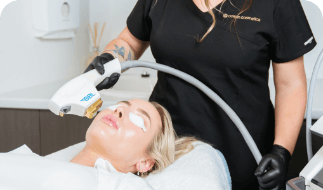Often first mistaken as large freckles or age spots, Melasma is actually a skin disorder, where brown pigmentation appears in patches. Quite common in women during pregnancy, the condition occurs when the cells under the skin (called melanocytes) are stimulated to produce an excess of the brown pigment (called melanin). The cells can be in the deep or surface layers of the skin, and sometimes both. Ocean Cosmetics offer a range of therapies to address this condition, so don’t hesitate to call us to discuss any concerns.
It is usually seen on the face, especially the forehead, cheeks, and top lip. Sometimes other areas are affected, such as the neck and forearms, but this is rare.
Patients seeking advice typically present with light to dark brown patches of varying size on the face. Some patients have one patch, while others will have multiple. There are three main patterns of distribution of the patches, named according to the location of the affected areas. The most common is the “centrofacial pattern”, involving the forehead, cheeks, top lip, nose, and chin.
Diagnosis of melasma will involve a medical history, particularly pertaining to sun exposure, family history, and hormonal history (including the use of hormone treatments and events such as pregnancy and menopause).
There are a number of common causes of melasma, including genetics, hormonal changes (in women – for example, use of the pill, and pregnancy), exposure to the sun, the use of some cosmetics, and pharmaceutical products (such as steroids and sex hormones).
Treatments are tailored to the severity of the pigmentation, the patient’s objectives, and the prevention of worsening any existing patches or the creation of new patches. The most appropriate course of action will also depend upon the factors involved in the development of the melasma (e.g. sun exposure, or hormonal causes). Treatment plans and concerns should be addressed by Ocean Cosmetics Cosmetic Physicians.
Discontinue underlying causes of melasma – Adhere to sun protection guidelines with the use of sunscreen ( eg B3T), protective clothing and hats, and avoid exposure to direct sunlight and artificial UV rays (i.e. tanning beds); and discontinue the use of hormone treatments.
Cosmelan Peel – this treatment significantly reduces freckles, age spots and pigmentation by utilising a powerful two phased approach. The process involves applying a custom peel formula to the superficial and damaged outer layer of skin. The skin then, in some cases, crusts, scales, and peels over several days. You’re also given a specially formulated skin routine to follow during this process.
Topical Treatments – At Ocean Cosmetics, our Cosmetic Physicians will prescribe a protocol to combine various products to achieve the best & most durable results. For melasma unresponsive to topical treatment, intervention with chemical and light therapy is considered moderately effective.
Chemical peels cause exfoliation of the superficial layers of skin (or deeper if required and indicated) in a controlled fashion. The skin cells regenerate within 3-5 days. Multiple sessions are required. Peels can be used alone, but have shown most benefit when used in combination with a topical treatment.
Laser therapy is usually reserved for the most severe cases of melasma, and only when other options have been unsuccessful. There are a number of different laser treatment options available eg Fraxel 1927/1550, Clear+Brilliant Laser, Revlite Qswitch Laser, which should be recommended and used only by our qualified Cosmetic Physicians. Like chemical peels, multiple sessions are usually required.
Please note: Melasma is a recurring skin condition. Treatment may improve the condition for a time, but further exposure to triggers such as sun and hormones (including through multiple pregnancies), may signal recurrence.
Recommended treatments

Dr Gina
“I sometimes refer to Melasma as ‘the diabetes of skin conditions’ as we can not eliminate it, only manage it. It’s a common condition that affects many women, myself included. There’s a lot of factors to consider when treating Melasma, but it’s important to cover up and take care of your skin by limiting sun exposure, as well as treating in clinic.”
DR GINA MESSIHA
(Cosmetic Doctor) MB BS FRACGP


